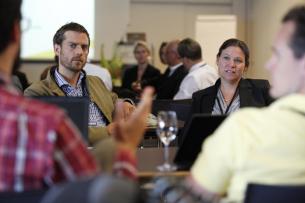There are a range of sustainability tools for water. However tools alone do not automatically mean that services will improve, especially for the poorest and most vulnerable.
Published on: 03/07/2014
More sustainability tools exist for water than for sanitation or hygiene. With a strong focus in the 2014 WASH Sustainability Forum on practical tools and approaches, you might think this is a good thing. But is it?
''The number of tools actually indicates that we are working in a fragmented way"
“The number of tools actually indicates that we are working in a fragmented way. If we get caught in a discussion about who’s tool is the best, we miss the point which is that we want to get government ownership” said José Gesti Canuto, one of the water ‘track leads’ at the Forum.
Considerations regarding water sustainability tools include:
 To increase the usefulness of tools and the likelihood that they can be taken up by governments, group deliberations recommended:
To increase the usefulness of tools and the likelihood that they can be taken up by governments, group deliberations recommended:
There was a broader discussion on how can we use tools as a way to engage in discussion with government and the private sector. There is a lot to do, especially around mobilising government commitment to increase sector financing and operationalise national and global commitments such as in the Sanitation and Water for All global partnership - SWA.
‘How sustainable is sustainability?” asks Stef Smits “Getting a sustainability tool institutionalised in the sector is a long and messy process, but it’s critical for ensuring tools are not just a one-off effort. We need to get tools applied at the level that national and local governments can use them on a recurrent basis.”
With all the excitement about tools, it is easy to forget the next step: we need to do better! Making sense of the data and the taking the necessary action. If your tool has 80 indicators, and 20 of them obtain a poor score, how do you prioritize which ones to act upon and how?
This issue of ‘resolution’ or closing the monitoring and learning loop, was excellently raised by Susan Davis in her pecha kucha presentation on Tuesday. Clearly, tools are not a substitute for human engagement and sense making.
"Tools are necessary, but they are not enough. We need to make radical changes in the way the development sector supports the development of wash services"
If we fail to get both the tools and their findings used, then we will not address the persistent failures of our sector. The tools, however good, should not be the starting point of our conversations. “Instead”, said José Gesti Canuto “We need to start by asking governments how can we help you in your mandate? We need to put more effort into strengthening country monitoring systems and government capacity to use the data for action.”
Tools can help in a process of engaging different actors in a discussion to better understand what the sustainability gaps are and to clarify who has what role in improving the current situation. But, as David Schaub Jones pointed out, NGOs should stop talking about sustainability tools and align with the language used by government.

Several participants suggested tool developers to commit to making the tools, their costs and their underlying methodology available publicly. This would enable others to learn and ‘steal from the best’.
In the concluding session of the Forum, Guy Norman commented: “Tools are necessary, but they are not enough. We need to make radical changes in the way the development sector supports the development of wash services”.
The water sessions at the WASH Sustainability Forum first explored existing tools and then examined more generic design principles of such tools, and the critical next question: what is needed to move from tools to sustainable services?
At IRC we have strong opinions and we value honest and frank discussion, so you won't be surprised to hear that not all the opinions on this site represent our official policy.